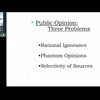deliberating

James Fishkin: Is Deliberation an Antidote to Extreme Partisan Polarization?
James Fishkin: Is Deliberation an Antidote to Extreme Partisan Polarization? Reflections on “America in One Room” This talk is positioned at the intersectionof two literatures: partisan polarizatio
POSTPONED. NEW DATE PENDING. James Fishkin: Democracy When the People Are Thinking: Applications of Deliberative Democracy
Postponed. New date pending. James Fishkin, Professor of Communication, Professor of Political Science (by courtesy) and Director of the Center for Deliberative Democracy, Stanford University. Abstract D
James Fishkin: Is Deliberation an Antidote to Extreme Partisan Polarization? Reflections on “America in One Room”
AbstractIs Deliberation an Antidote to Extreme Partisan Polarization? Reflections on “America in One Room” Register here to join the seminar This talk is positioned at the intersectionof two literatures
What calibrating variable-value population ethics suggests
Economics & Philosophy Abstract Variable-Value axiologies avoid Parfit’s Repugnant Conclusion while satisfying some weak instances of the Mere Addition principle. We apply calibration methods to two
Katie Steele: Neutrality about creating good lives - No panacea for longtermism
Place: At the Institute for Futures Studies, Holländargatan 13, Stockholm, or online.REGISTERAbstractThe principle of neutrality can be seen as a direct response to the totalistapproach to evaluating popu

Katie Steele: Neutrality About Creating Good Lives - No Panacea For Longtermism
The principle of neutrality can be seen as a direct response to the totalist approach to evaluating populations of varying constitution and size: while the latter holds that the addition of a good lif

Lambros Roumbanis
My research focuses on the organization of expert judgments, evaluation technologies, selection mechanisms, and complex decision-making processes. More specifically, I study how organizations deal wit
Karsten Klint Jensen: Future Generations in Democracy
Karsten Klint Jensen, Associate Professor, Department of Food and Resource Economics (IFRO), University of Copenhagen. ABSTRACTIn this talk I ask whether the genuine representation of future generation

Karin Bäckstrand
I am a Professor in Environmental Social Science at the Department of Political Science at Stockholm University. My research revolves around global environmental politics, non-state actors in climate

The Technology Futures and Limits Project
This project aims to explore some of the fundamental limits of technology and its long-term future.








